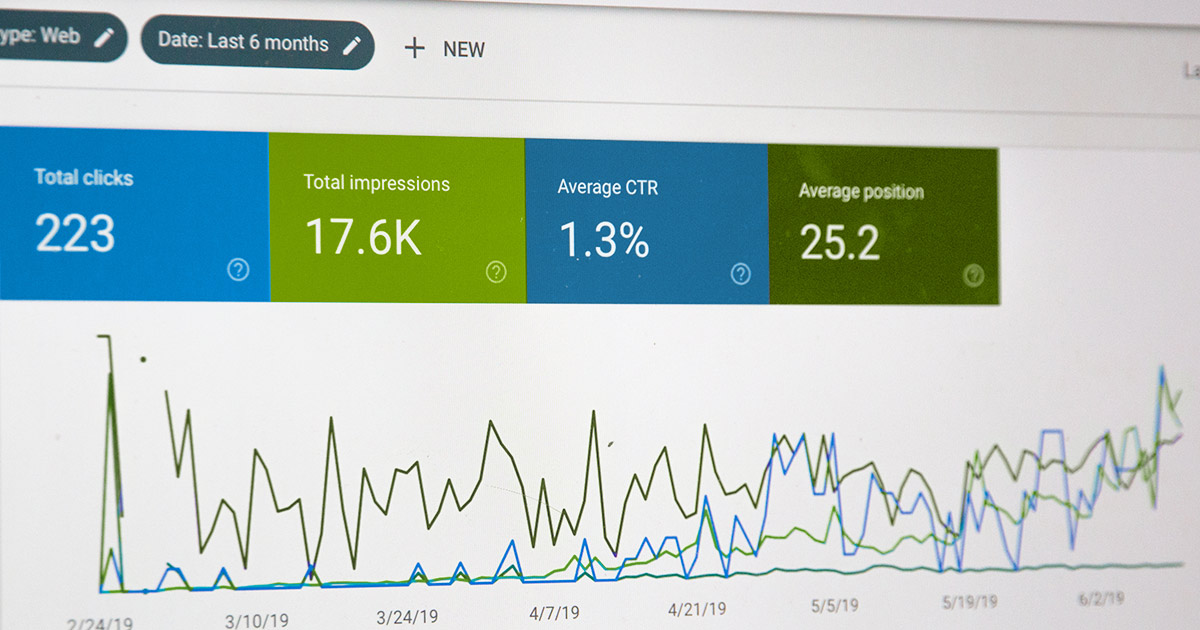[7 minute read]
We’ve been talking about digital marketing for small business. And boy is there a lot to talk about. For now, it’s time to get technical for a hot minute and talk about this thing we call analytics. Because the truth is, you can have a fabulous website that is optimised to get to the top of search results, you can have social media channels that are saying the right thing to the right people, but if you’re not harnessing the power of web analytics, you’re missing out on a big chunk of the action – and we wouldn’t want that.
Now if you’re a small business owner or marketer who is new to the big wide world of analytics, don’t be intimidated. We’ll break it down for you.
What are analytics?
When we talk about web analytics, we’re talking about the measurement of certain metrics (or pieces of information) that give us an indication of a user’s behaviour across different web pages. You might be interested in how many unique page views you’re getting on your website every day, or how long users are spending on your site, or how many pages they visit. All these metrics are web analytics, and they can revolutionise your digital marketing strategy.
Why do analytics matter?
Analytics provide you with insights into your customers and their behaviour. And if you can understand your customers’ behaviour, you can approach what you do more strategically. Analytics could help you make important decisions, from something as broad as what kind of content your audience wants to consume on your site, to something as granular as what colour to make your call-to-action button at the bottom of a landing page. Web analytics take the guesswork out of digital marketing. They help you to make informed decisions based on actual data. No more hit-and-miss marketing. With analytics it’s all in the detail.
Now what is this business about KPI’s and what does it have to do with web analytics?
If you’ve skimmed the surface of this ocean of possibilities called web analytics, you may have come across the term KPI, or Key Performance Indicator. These are the goals that you set for yourself as a small business. They’re a way to measure whether you’re achieving your business objectives, and web analytics are closely connected to it all. Let’s throw some examples out there to illustrate what we’re on about.
Better email open rates, for example, could be a KPI. Lowering the cost per click on your paid media ads, could also be one. You may even want to increase inbound links to your website to boost your online presence.
The temptation to digress and explore these metrics in more detail is overwhelming. So to keep us on track, we’re going to shoot some questions at Truevo’s performance marketer, Dirk Dijkstra who’s going to tell us a bit more about all this analytics stuff:
For a small business that’s just getting started, what are some important metrics to consider?
- New website (or shop) visitors per week or per month, as that will be the result of all your marketing activities.
- Number of leads i.e people from whom you have captured some contact details either in your shop or on your website.
- Followers on social media. Ideally split this per platform as some platforms will definitely become more important/relevant for your business.
- Social media engagement, as it is not always about the size of your audience but more about the quality of your audience. A quality audience i.e a very relevant audience, will engage more.
- Net Promoter Score (NPS), as this will indicate how happy your customers are with your service and their subsequent referring of your business to their friends and family. Treat your customer like gold! Wondering what a Net Promoter Score is? Here’s a quick read.
Which web analytics tool would you recommend to small businesses?
- Number 1 is (and will always be) Google Analytics. It’s free, super powerful and quite easy to work with and draw insights from.
- For a list of alternatives to Google Analytics I suggest a top 10 provided by one of the leading search engine experts, Search Engine Journal.
- Slightly different heatmap tools like Smartlook and Hotjar have gained massive popularity as they help website owners to understand how their users interact and click on their website so they can further optimize their website.
- A third cool and free tool is Google Optimize which is a tool for great A/B tests on your website. It will help you decide which button to use, which CTA works best and which header to use.
Why do KPI’s matter?
- As a business owner, you need to know in which parts of your business you’re succeeding and in which parts you are failing. If you generate lots of foot traffic but your NPS is super low, then you’ll never be really successful and you’re spending too much time and effort on acquiring all those visitors.
- Every business is different, but every business needs to pick their most important key performance indicators so they can define what success looks like.
- Depending on the size of your business, KPIs will also help identify areas within your business that are doing well, versus areas that are under performing. And these insights will allow a business manager to take the necessary steps with the relevant staff or managers in problem areas.
- With lots of KPIs widely available from all sorts of companies and industries it has become quite easy to benchmark yourself against your competitors. Google Analytics even has a very cool benchmark report available where you can compare your performance per country, per website traffic size and per industry and even per industry sub-category.
How do you go about setting realistic KPI’s as a small business?
- Create a sheet (ideally a Google sheet) that you and any necessary colleagues can work on together. Depending on the size of the business you could have different people being responsible for different (sections of) KPIs.
- Start with a few KPIs only and add more when you see that certain numbers are becoming more important.
- Just like businesses change, KPIs can also be changed, so feel free to replace KPIs with even more relevant KPIs.
- And don’t measure just for the sake of measuring. KPIs are meant to be used to take action on, and to help improve and optimise business operations.
- Make sure to track the success of all your paid marketing/advertising activities whether it’s an order of flyers, a loyalty stamp card or a boosted post on Facebook.
- Calculating Return on Investment (ROI) is a key performance indicator for any business.
Can you share some tips that will help small businesses to make the most of the data they collect from web analytics?
- Google Analytics is pretty easy to use but it might be good to have at least one person on your team to sign up for a Google Analytics exam.
- There’s lots of ways to view data. This includes graphs and pie charts but you can also export data as CSV, XLS and even as a PDF to share with others in your company.
- Make sure to export and store your raw data in the cloud on a regular basis. Not just in case anything goes wrong but it’s always good to keep a historical record of all your key business data including your web analytics.
- If you or one of your employees loves data, you might want to consider the use of more advanced data analytics tools like Google Studio, Power BI, Qlikview or Tableu.
Did you enjoy this quick read? Do you want us to explore web analytics in more detail? Tell us on social media: Facebook, Instagram, Twitter and Linkedin.
P.S. Looking for a comprehensive payments solution that will get you paid anywhere, any time? Get Truevo. We can’t wait to connect with you.



